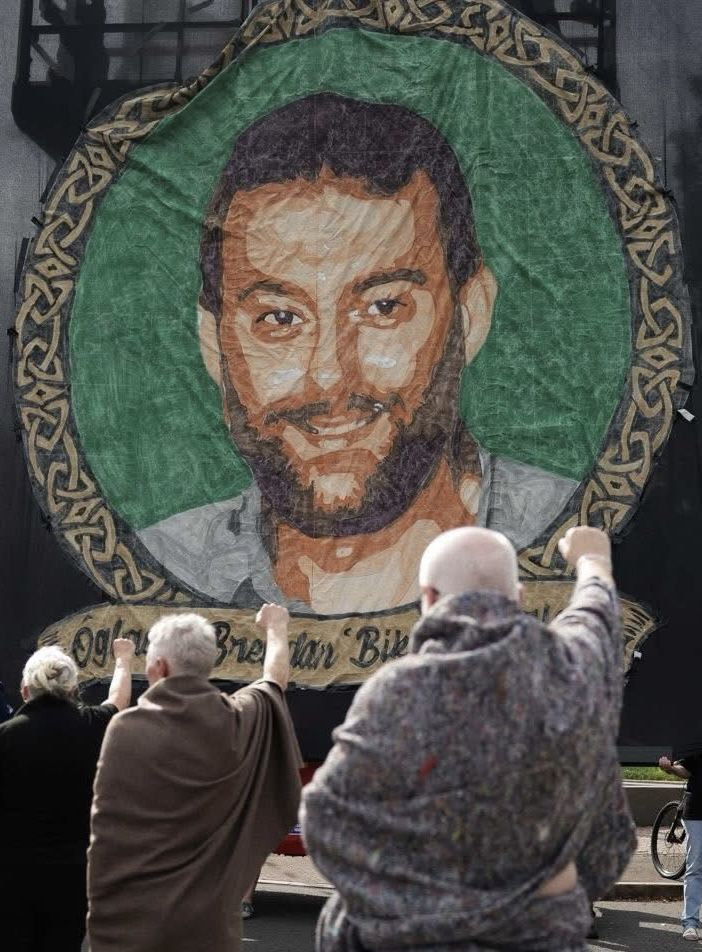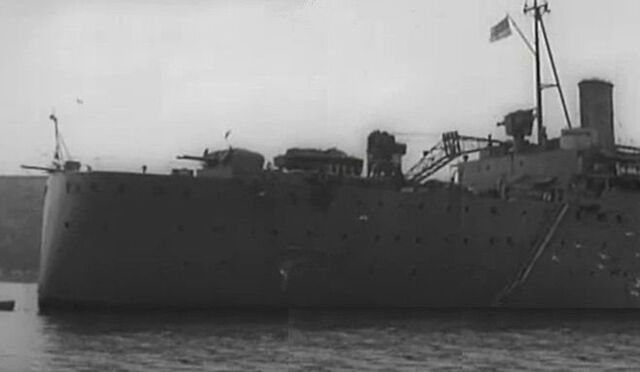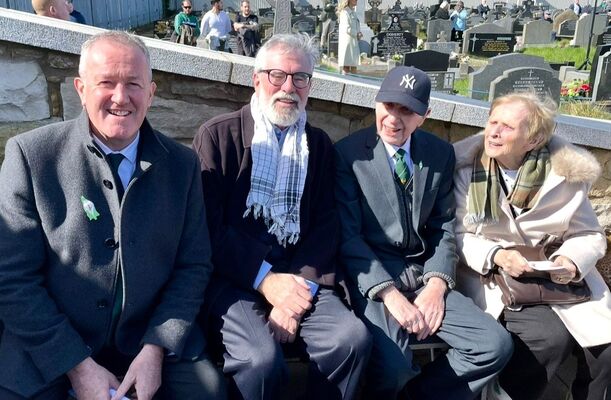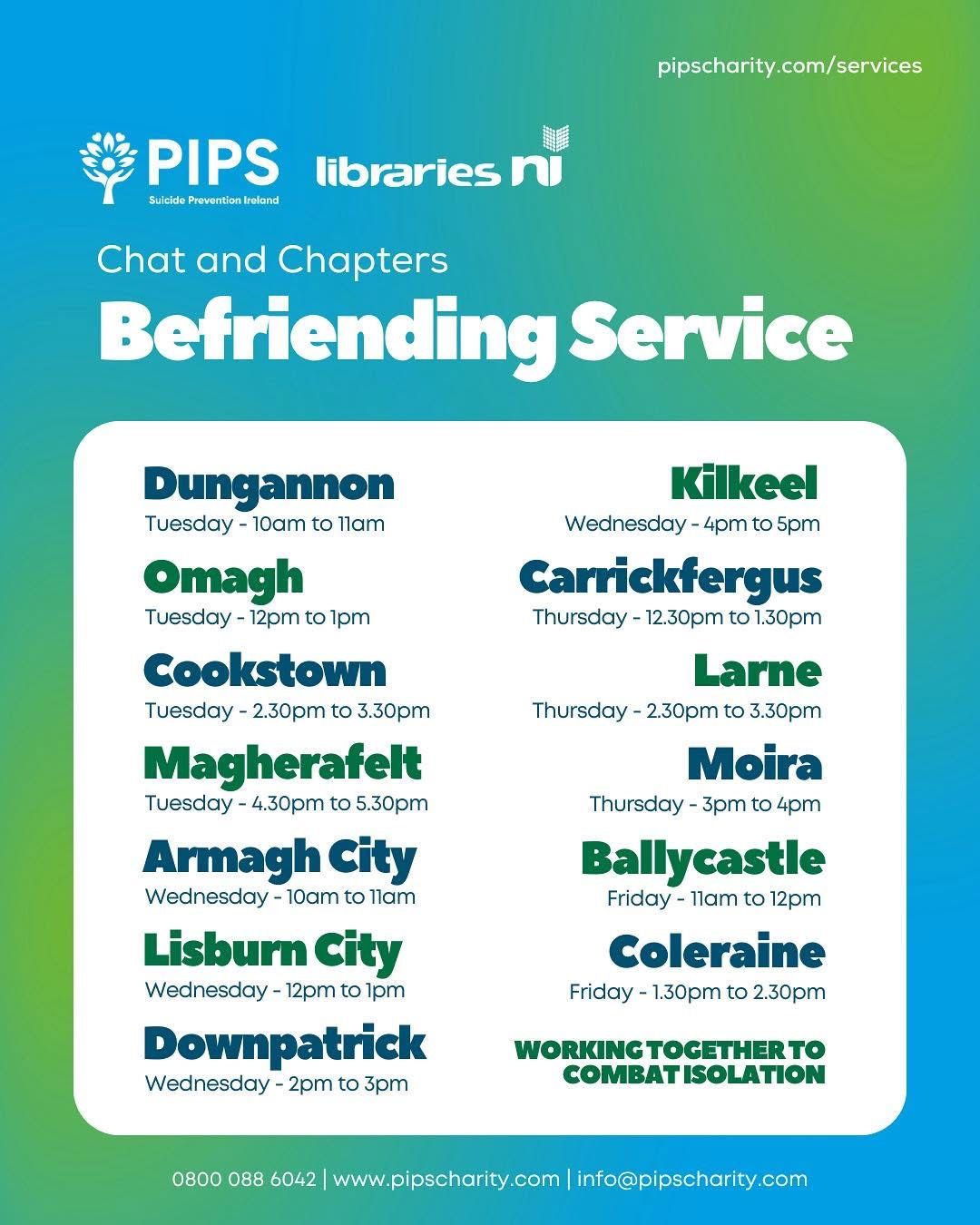THE eight months of the 1981 hunger strike campaign changed the political landscape in Ireland. It was, as Síle Darragh, former OC of the republican women prisoners in Armagh Women’s Prison, said recently, “our 1916”.
It began on March 1, 1981. When it ended on October 3, ten hunger strikers were dead. Bobby Sands had been the first to die on May 5. He was followed over the following four summer months up to August by Francis Hughes, Raymond McCreesh, Patsy O-Hara, Joe McDonnell, Martin Hurson, Kevin Lynch, Kieran Doherty, Thomas McElwee and Micky Devine.
On Sunday last people came in their thousands, from all parts of the island of Ireland, and from overseas, to participate in the annual August march and to honour and commemorate the ten who died 44 years ago in the H-Blocks and others who starved to death decades before this, including Frank Stagg and Michael Gaughan, who died in the 1970s in prison in England.
The stories of the ten hunger strikers and of their comrades in the H-Blocks and Armagh Women’s Prison, who spent five years on the protest for political status, are many.
The brutal physical and mental abuse the women and men endured in defence of the struggle for freedom and in rejection of the label ‘criminal’ has been articulated in a series of books, poems and articles. These include Ten Men Dead by David Beresford; Seachtain ar an Bhlaincéad by Ruairí Ó Dónaill; The Crunch has Come by Eoghan MacCormaic, written while he was in the H-Blocks and using the pen name Frankie O ‘Brien; Nor Meekly Serve My Time by some of the POWs; John Lennon is Dead by Síle Darragh; Time Shadows by Laurence McKeown; 6000 Days by Jim (Jaz) McCann: ; Pluid: Scéal na mBlocanna H, 1976-81 by Eoghan MacCormaic; Playing My Part by Gerry Kelly; and the many poems and articles written by Bobby Sands. And there are others including by this writer.
Speaking at the Republican Plot in Milltown Cemetery where Bobby Sands, Joe McDonnell and Ciaran Doherty are buried, Uachtarán Mary Lou McDonald caught the legacy and memory of that time when she described the hungerstrikers as: “Ten brave Irish men who laid down their lives on hunger strike for the freedom of their country. Starved and persecuted they lay in the H-Blocks and with every sinew of their being, they refused to be criminalised, refused to be broken, refused to be defeated.”
REMEMBRANCE: Mary Lou McDonald at the hunger strike commemoration with Ógra Shinn Féin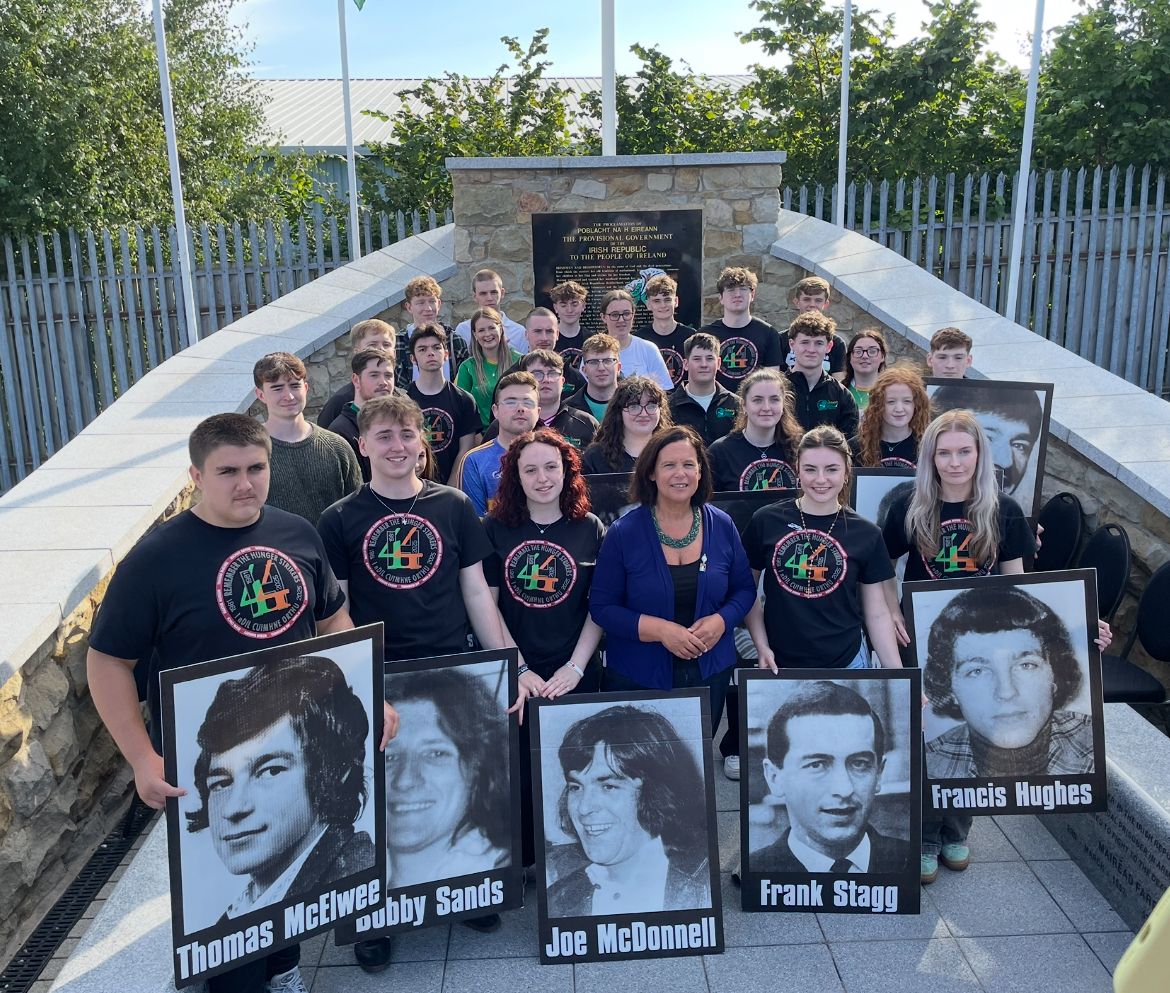
She went on: “For them, we will do the work, we will walk the extra yards, we will write our nation’s next chapter – Ireland, united and free... Joined by heroic women in Armagh Gaol, they hungered not only for political status, but for the Ireland envisaged by the Proclamation – for the Republic... The legacy of the hunger strikers calls to us today. To stay true to the vision and the dream for which they gave everything. To never despair. Never lose hope. Never give up.”
Perhaps one of the most emotional moments of the day was as the huge march made its way along the Falls Road toward Milltown. A huge banner of Bik McFarlane was unfurled as the march rounded the bend on the Falls Road, just above Beechmount. The blanket men and women who were leading the commemoration stopped and for a minute lifted their clenched fists in silent salute to the friend and comrade who had led them through that terrible year.
In his contribution to Guthanna ’81, published last Saturday, Bik, who died earlier this year, wrote about that experience. His account provides an insight into the pain and trauma, that went into the planning and preparing for the hunger strike and which included the reality of men dying.
Bik wrote:
Bobby, as OC, was to lead that hunger strike.
We developed a strategy that one man would go first, followed two weeks later by a second, followed a week or so later by two more.
So Bobby was to be followed by Francis Hughes, to be followed a week later by Patsy O’Hara and Raymond McCreesh, and it was staggered that way.
A lot of people thought, you know, looking back, people have asked us, have asked me and different people, that you were very clinical, hard-nosed in terms of your attitude to this. I would say, yes, but we also developed a replacement strategy in order to send a very, very clear signal to the Brits that if anybody died on hunger strike they would be replaced with another hunger striker, letting everybody know that we weren’t for lying down. Also, that the individual had the responsibility to terminate, or not, his hunger strike. So the total responsibility fell on the shoulders of the individual who was on hunger strike, which is harsh, which is hard, but unfortunately it was the nature of the circumstances.
That’s where we found ourselves.
Bobby had come back from a visit and at the time, if I’m not mistaken, I think Danny Morrison had had been on the visit – if it wasn’t prior to Danny being excluded from the prison. He’d come back from the visit, just given a bit of news on how things were going and in the midst of it, you know, he was talking and he says, ‘Oh, yeah, and I told him [Danny] that you would be taking over.’
I said, ‘Taking over what?’
He says, ‘I told him to tell the lads outside that you’d be taking over as OC.’
I said, ‘I’m not – I’m not taking over as OC. I’m the PRO [press officer]. I’m the guy who organises the letter-writing campaigns. I’m the guy who writes the letters, does the PR, or gets guys to contact people.’
‘No, no, no, no. I’m not having it any other way. I’ve just told him that that’s the way it’s going to be.’
‘Well, I’m not doing that.’
He says, ‘Well you have to do it.’
‘I am not even up there on the list of the pecking order in terms of, you know, the “pay scale” because there’s an OC, a Vice OC. There’s an Adjutant. There’s an Education Officer... You have everything. I’m stuck down at the bottom of that list. There are other people more senior than me. For example, Séanna Walsh is the Vice OC. He’s been in the cages with you. He’s been out, he’s back in, and he knows the politics of this protest upside down and the inside out – possibly better than anybody else. And he’s next in line.’
And then Bobby said to me, ‘There’s only one thing you’re missing there.’
‘I’m not missing anything.’
‘Oh, you are. He’s my best mate.’
‘What has that got to do with anything?’
‘Well, quite frankly, if this hunger strike goes the distance and we reach a crisis period and the Brits just decide, they may decide at some stage to introduce negotiations. If I end up in a crisis period and this comes to negotiations and the package that they put on the table is not acceptable,’ he says, ‘Séanna will not let me die.’
‘So what you’re saying is that I would let you die?’
‘Yeah, that’s right.’
‘Well, thanks very much for that vote of confidence in my capabilities and my sensitivities.’
‘No, no, no. I know the craic with you and that’s the way it has to be. So you need to do it.’
And there was no answer after that because, I mean, I just felt that the vote of confidence that he had in me, his faith and what I’d be able to do was far more than what I felt that I was able to do. So, very, very reluctantly then, at the end of that, I’m saying to myself, ‘Here’s a man putting himself on the line, putting his life on the line, to all intents and purposes, he knows the minute he steps on to this that he’s not coming out the other end of it, and he has the confidence in me to help him along that road. And if push comes to shove that I need to be able to say to the Brits, “That’s not what he asked for. That’s not what the hunger strikers want, so there’s no deal.”’
It takes courage to go on a hunger strike. It takes courage to plan how you will die and to ensure that others will follow. And it takes courage to be the leader who is expected to stick with the plan, no matter the consequences.
The hunger strikers were extraordinary human beings. All these years later I remain in awe of their selflessness and their bravery. Tiocfaidh ár lá.

